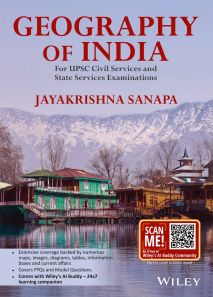Geography of India: For UPSC Civil Services and State Examinations
ISBN: 9789363866478
690 pages
For more information write to us at: acadmktg@wiley.com

Description
Wiley’s Geography of India is an essential resource for mastering Indian Geography, a crucial component of the UPSC Civil Services Examination. This comprehensive guide is meticulously designed to cover all key topics from the Indian Geography syllabus, including both static (unchanging) and dynamic (evolving) aspects. The book features Previous Years’ Questions (PYQs) to help aspirants understand the exam pattern and focus on important areas. Each chapter delves into critical themes such as physical geography, human geography, economic geography, socio-economic factors, and regional cooperation in India. To enhance learning and retention, the content is enriched with detailed maps, tables, images, and diagrams, making complex concepts more accessible and engaging. With the inclusion of current affairs, chapter-wise model questions, and handy information boxes, this book serves as a one-stop solution for UPSC aspirants aiming to excel in Indian Geography.
1 India: Location, Extent, and Features
Introduction
India’s Frontiers
Indian Ocean
Routes into India
2 Geological Structure of India and Its Evolution
Introduction
Geological History of India
Rock Systems of India
3 Physiography of India
Introduction
The Himalayan Mountains
The Great Plains of North India
Regional Division of the Northern Plains
The Peninsular Plateau
The Indian Desert
The Coastal Plains
The Islands
Volcanism in India
4 Drainage System of India
Introduction
The Himalayan River System
The Peninsular Drainage System
Usability of Rivers
National Inland Waterways
River Interlinking Project
5 Climate of India
Introduction
Factors Affecting Indian Climate
Monsoon Winds
6 The Natural Vegetation in India
Introduction
Moist Vegetation
Dry Vegetation
Montane Vegetation
7 Soils of India
Introduction
Characteristics of Soil
Soil Horizons or Soil Profile
Types of Soils
Distribution of Soils in India
Problems of Indian Soils
Soil Erosion
Human Factors Causing Soil Erosion
Consequences of Soil Erosion
Soil Conservation
8 Hazards in India
Introduction
Hazards and Disasters in India
Earthquake
Tsunami
Drought
Flood
Cyclone
Landslide
Avalanche
9 Population
Introduction
Size of Indian Population
Population Growth
Census in India
Population: Distribution and Density
Migration in India: Its Types, Causes, and Consequences
Major Demographic Indicators
Demographic Dividend vs. Demographic Divide
The Future of Indian Population: World Population Prospects, 2024
10 Cultural Setting
Introduction
Ethnic Composition
Tribal Population
Religious Composition
Sex and Age Composition
Language Diversity
11 Human Settlements
Introduction
Classification of Settlements
Rural Settlements
Urban Settlements: Trends and Classification
Problems of Urbanization and Growth of Slum
Town Planning
12 Regional Development and Planning
Introduction
Five-Year Planning in India
Regional Dimensions of Planning in India
Development of Backward Areas
Command Area Development
Watershed Management and Rainfed Area Development Programme
Aspirational District Programmes
Border Area Development
Damodar Valley Corporation (DVC)
National Capital Region (NCR) 2
Poverty in India
13 Resources of India
Introduction
Resources: Definition
Natural Resources of India
Mineral Resources of India
Biotic Resources of India
14 Water Resources
Introduction
Indian Water Resources
Water Scarcity, Water Disputes and Conflicts
River Interlinkage Programme
National Water Grid
International Cooperation
Water Conservation Efforts
Rainwater Harvesting
15 Irrigation and Projects
Introduction
Need for Irrigation
Irrigation Techniques
Intensity of Irrigation
Multipurpose Projects
16 Agriculture
Introduction
Land Utilization Pattern in India
Indian Agriculture: Characteristics and Problems
Determinants of Agriculture
Land Reforms in India
Agricultural Inputs
Livestock
Fisheries and Aquaculture
Sericulture
Horticulture
17 Revolution in Agriculture
Introduction
Intensive Agriculture Development Programme
Components of the Green Revolution
First and Second Green Revolution
Green Revolution: Impacts, Demerits, and Ecological Limitations
White Revolution
Blue Revolution
Golden Revolution
Silver Revolution
Pink Revolution
Dry Farming
Agribusiness
18 Spatial Organization of Agriculture
Introduction
Cropping Patterns
Agriculture Productivity
Agricultural Intensity
Crop Combinations
Land Capability
Contract Farming
Agricultural Regionalisation
Agro-Climatic and Agro-Ecological Regions
Major Crops of India
19 Energy Resources
Introduction
Conventional Energy Sources
Coal
Coal Deposits in India
Natural Gas
Crude Oil
Petroleum and Natural Gas Deposits in India
Hydropower
Nuclear Energy
Non-Conventional Energy
Energy Crisis and Conservation Strategy
Conservation Strategies to Address the Energy Crisis
20 Industries
Introduction
Evolution of Industries in India: From Traditional to Colonial and Post-Colonial Economies
Classification of Industries
Industrial Policy
Textile Industry: Cotton, Jute, Wool, Silk
Iron and Steel Industry
Aluminium Industry
Automobile Industry
Fertiliser Industry
Cement Industry
Paper Industry
Leather Industry
Pharmaceutical Industry
Cottage Industry
Multinational Companies
Special Economic Zones
Industrial Corridors
Food Processing Industries
21 Transport and Communication
Introduction
Railways
Roadways
Air Transport
Water Transport
Urban Transport System
22 Trade
Introduction
Trends in Indian Trade
Geopolitical and Global Economic Impacts
Composition of India’s Exports and Imports
Salient Features of India’s Foreign Trade
Important Trade Agreements
Foreign Trade Policy of India
23 Tourism
Introduction
Tourism in India
Places of Tourist Interest
Eco-Tourism
24 Environmental Degradation
Introduction
Deforestation and Land Degradation
Pollution
Global Warming and Climate Change
Change in Land Use Pattern
25 Conservation Efforts
Introduction
Environmental Awareness
Environmental Impact Assessment (EIA)
Environmental Management
Wildlife Conservation
Environmental Laws and Regulations
International Agreements and Conventions
26 Geopolitical Issues
Introduction
Strategic Location of India
Cross-Border Terrorism and Issue of Piracy
Geopolitics of South Asia
India’s Role in World Affairs
Future of Geopolitics: Emerging Global Challenges and India’s March Ahead
27 Regional Cooperation
Introduction
SAARC: A Struggle for Regional Cooperation
Bay of Bengal Initiative for Multi-Sectoral Technical and Economic Cooperation (BIMSTEC)
Indian Ocean Rim Association (IORA): Enhancing Regional Cooperation in the Indian Ocean
I2U2
QUAD
Shanghai Cooperation Organization (SCO)
BRICS: India’s Perspective on Evolution, Challenges, and Strategic Importance
East Asia Summit (EAS)
Mekong-Ganga Cooperation (MGC)
Commonwealth of Nations

